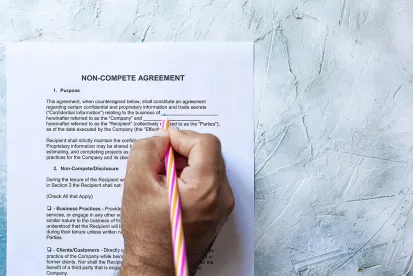Since the passage of the Georgia Restrictive Covenants Act (O.C.G.A. § 13-8-50 et seq.) in May 2011, there has been some level of uncertainty regarding the extent to which a court may “blue pencil” or modify an otherwise unenforceable covenant, including whether a court may extend the restrictions period of a post-May 2011 noncompete agreement. With the recent decision in Daneshgari v. Patriot Towing Services, LLC, employers have a bit more clarity, but with some remaining uncertainty, as the Court of Appeals of Georgia held that a trial court erred in extending an injunction beyond the contractual expiration of the term of a noncompete agreement.
Background
Patriot Towing Services (PTS) purchased the assets of a towing company owned and operated by Khosrow Daneshgari on June 23, 2016. As part of the purchase agreement, the parties entered into a “Non-Competition, Non-Disclosure, and Non-Solicitation Agreement” containing a non-compete provision with a restrictions period of four years, which was scheduled to expire on June 22, 2020. (Georgia courts will generally presume a time period restriction of four years is reasonable when the restrictive covenant sought to be enforced is against the owner or seller of all or a material part of the assets of a business, professional practice, or another commercial enterprise.) Daneshgari began operating a competing business within one month of the execution of the agreements.
PTS filed a lawsuit against Daneshgari for his violation of the non-compete agreement, and on June 26, 2018, the trial court entered a preliminary injunction and ordered Daneshgari to cease violating the non-compete provision. Daneshgari continued violating the non-compete agreement after the injunction, and PTS then filed a motion for contempt. The trial court found that Daneshgari was in willful contempt and ordered him incarcerated until he paid PTS $20,000 in attorneys’ fees. After making the payment and being released from his incarceration, Daneshgari resumed violating the noncompete agreement. PTS filed a second motion for contempt, and on September 3, 2020, the trial court found Daneshgari in contempt, struck his answer, entered a default judgment against him, and extended the June 26, 2018, injunction, “enjoining Daneshgari from violating the non-compete provision ‘until further order of this Court.’” Daneshgari appealed the trial court’s ruling to the Court of Appeals of Georgia.
The Court of Appeals’ Analysis
The appellate court applied the Supreme Court of Georgia’s implicit rejection of “the idea that ‘equity permits a court to extend the period of a non-compete agreement’” and primarily relied on two pre-Restrictive Covenants Act holdings: Coffee System of Atlanta v. Fox, issued in 1971, and Electronic Data Systems Corp. v. Heinemann, issued in 1997. In Coffee System, the Supreme Court of Georgia rejected the employer’s argument that litigation tolled the running of a non-compete period, reasoning that “[c]ourts do not make contracts for the parties” and that “[s]uch an extension would in effect rewrite the … agreement.” In Heinemann, the Supreme Court of Georgia “again rejected the argument that when a party sues to enforce a non-compete agreement, the litigation itself should toll the terms of the agreement” and reiterated that “‘[t]he courts should hesitate to rewrite private contracts’” because “‘[j]udicially providing a tolling provision would effect such a rewrite.’” Accordingly, the appellate court found that the trial court had essentially rewritten the parties’ noncompete agreement and exceeded its powers when it indefinitely enjoined Daneshgari from violating the non-compete provision following the expiration of the restrictions period.
Key Takeaways
The holding in the Daneshgari case serves as a reminder that despite the Restrictive Covenants Act’s pro-business provisions, such as O.C.G.A. § 13-8-53(d), which authorizes a court to “modify a covenant that is otherwise void and unenforceable,” some common law holdings prior to the passage of the Restrictive Covenants Act are still very much alive. In light of Daneshgari, employers may want to carefully tailor restrictive covenant agreements to include thoughtfully crafted tolling provisions and review existing restrictive covenant agreements to safeguard expectations in the event of a breach. Perhaps if Daneshgari’s non-compete agreement had included an enforceable tolling provision, PTS could have argued for an extension of the restrictive covenant. But in the absence of such a tolling provision, parties seeking to enforce restrictive covenants may be at risk when the breaching party pursues a judicial challenge to the covenant’s enforceability, which often can take years to work through the courts.





 />i
/>i
